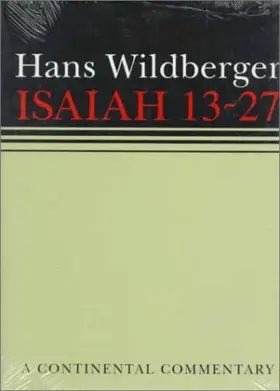

Isaiah 13–27
Pages
624 pages
Publisher
Fortress Press
Published
1997
ISBN-13
9780800695095
Reviews
Minneapolis: Fortress Press, 1997. Pp. x + 624, Cloth, No Price Available, ISBN 0800695097. Volume: 2 Aaron Park San Francisco Theological Seminary Claremont, CA 91711 This is a translated version of Wildberger's second volume of the Isaiah commentary, which appeared in 1978 in the Biblischer Kommentar series. It follows a basic pattern, a brief bibliography followed by discussions of textual problems, form (Gattung), setting, commentary, and theological/ideological purpose and thrust. Literature updates are furnished through 1979 based on the third volume. Introduction to the entire commentary (chapters 1-39) appears in the third volume, Isaiah 28-39. The text is Wildberger's own translation and other biblical texts are either from the RSV (as in Volume 1) or from the NRSV (as in Volume 2). Wildberger's commentary on Isaiah 1-39 is most extensive, comprising of over 1,600 pages in a condensed type. The second volume deals with the oracles against the nations (Isaiah 13-23) and the Isaiah Apocalypse (24-27). Wildberger maintained that Chapters 13-27 of the book of Isaiah formed a distinct literary unit. Formally, this section begins with a characteristic heading, mas8s8a) 3 < , (13:1; 15:1; 17:1; 19:1; 21:1, 11, 13; 22:l; 23:1). These are also united by the content in that oracles against the nations separate these chapters from the previous chapters 1 - 12 and from the following chapter 28. Chapters 13-23 display a number of literary growth, composed of small Isaianic oracles directed against foreign people and of a collection of the oracles against the nations from the exilic and postexilic era. The oracles against Babylon begin and form the heart of the present oracles against the nations. The beginning of Isa 13:1, lbb )#m , is expanded by the additional words similar to 1:1 and 2:1: "which Isaiah, the son of Amoz, saw.
[Full Review]
